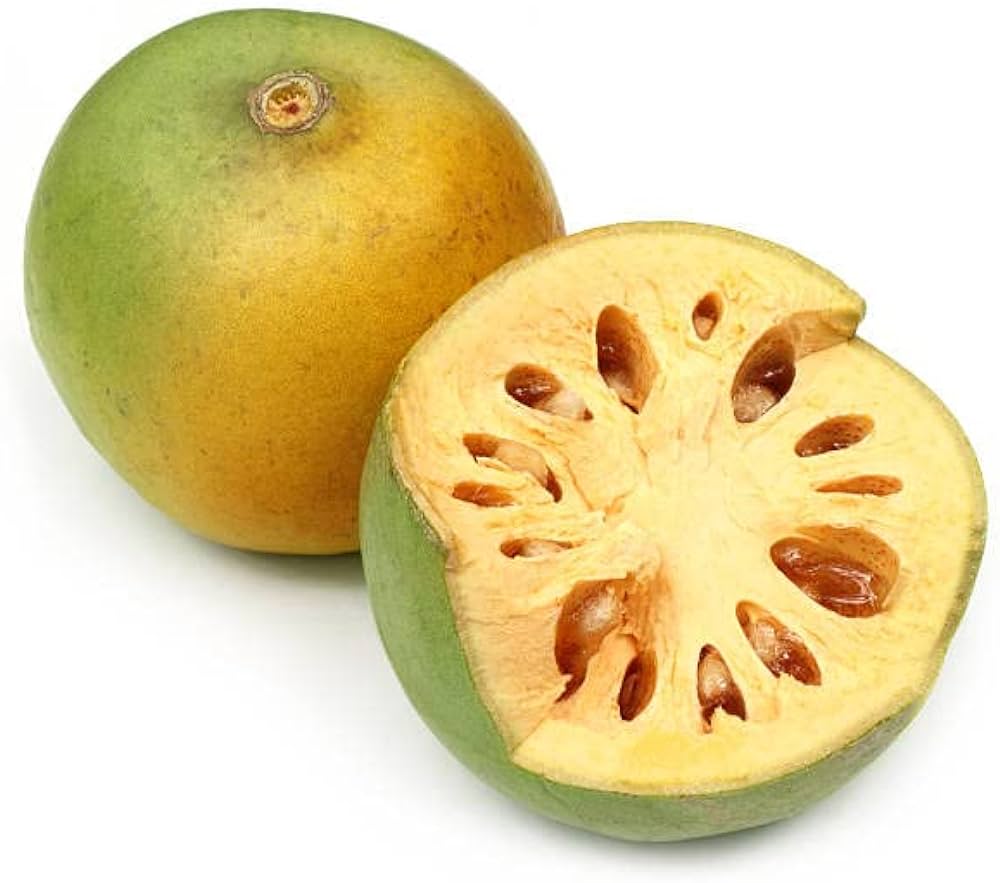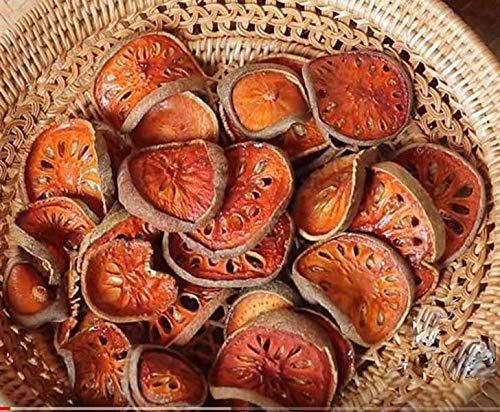Introduction
Bael Aegle Marmelos Nature’s Most Natural Medicinal Fruit In a world filled with countless fruits packed with health benefits, one often overlooked treasure is the bael fruit (Aegle marmelos). Native to India and cultivated throughout the Indian subcontinent, this tropical fruit has been revered and cherished for its medicinal properties for centuries. Known as the “King of Fruits” or the “Wood Apple,” bael is celebrated not only for its delicious taste but also for its immense healing potential.
Bael can be identified by its tough, woody rind, which protects its sweet, aromatic, and fleshy pulp inside. The fruit has a unique flavor, somewhere between sweet and sour, making it a delightful treat for the taste buds. But it is beyond its flavor that the true magic of bael lies – within its numerous health benefits.
Digestive Health: One of the most well-known uses of bael is for improving digestion. The high fiber content helps regulate bowel movements, preventing constipation and reducing the risk of gastrointestinal issues such as irritable bowel syndrome. Bael also possesses laxative properties that aid in maintaining a healthy gut and preventing the build-up of toxins in the intestines.
Immune Booster: Bael is a powerhouse of vitamin C, antioxidants, and phytonutrients that enhance the immune system. Regular consumption of this fruit can potentially shield the body from various infections, colds, and minor illnesses, keeping you healthy and strong.

You can read our another post on Biju Patnaik :Architect and Builder of Modern India
Heart Health: Bael is an excellent source of potassium, an essential mineral for maintaining heart health. Potassium helps regulate blood pressure and reduces the risk of heart-related diseases such as hypertension and stroke. Including bael in your diet can contribute to a healthier cardiovascular system.
Liver Care: The liver is one of the most vital organs in our body, responsible for detoxification and filtering blood. Bael is known for its hepatoprotective properties, which help protect the liver against damage caused by free radicals and toxins. Regular consumption of bael juice or pulp can promote liver health and improve its overall functioning.
Respiratory Support: Bael possesses antimicrobial and anti-inflammatory properties that can aid in relieving respiratory issues. It is particularly effective in reducing inflammation of the respiratory tract, alleviating symptoms of asthma, cough, and cold.
Diabetes Management: Bael has been traditionally used in Ayurvedic medicine for managing diabetes. The presence of polyphenols in this fruit helps regulate blood sugar levels and Bael Aegle Marmelos improve insulin sensitivity. However, it is essential to consult with a healthcare professional for personalized advice on managing diabetes.
Apart from these main benefits, bael is also believed to possess antimicrobial, anti-inflammatory, and skin-healing properties. It has been used as a natural remedy for skin disorders, such as rashes and eczema, as well as for promoting wound healing.
Including bael in your diet is a great way to harness the numerous health benefits it offers. Bael Aegle Marmelos You can enjoy it as a fresh fruit, make a refreshing juice, or blend it into smoothies for a nutritious boost. Choose bael as a healthier alternative to sugary drinks or processed snacks, and reap the rewards that nature has provided.
Nature has gifted us with an abundance of medicinal fruits, and bael stands out as one of the most remarkable. Incorporating this fruit into your regular diet can not only satisfy your taste buds but also provide a natural, holistic remedy for various health concerns. So next time you reach for a snack, consider reaching for a bael fruit – and experience the wonders it can do for your well-being.
More: Wanted to download Odishashop.com visit here

Writer A FAQ For Bael Aegle Marmelos
What is Bael (Aegle Marmelos), and what are its medicinal properties?
Bael, scientifically known as Aegle Marmelos, is a fruit native to Southeast Asia and India. It is widely recognized for its medicinal properties and has been used in traditional medicine for centuries. Bael contains several active compounds, including tannins, flavonoids, and essential oils, which contribute to its therapeutic benefits. It is known to possess antibacterial, anti-inflammatory, antidiarrheal, and immunomodulatory properties, making it an excellent natural remedy for various health conditions.
How can Bael benefit digestive health?
Bael has long been revered for its positive effects on the digestive system. Due to its high fiber content, it aids in relieving constipation and promoting regular bowel movements. Bael has also been found to possess antimicrobial properties, helping to combat harmful bacteria in the gut. Additionally, it stimulates the secretion of digestive enzymes, improving overall digestion and nutrient absorption.
Can Bael help in managing diabetes?
Yes, Bael is beneficial for individuals with diabetes or those who are at risk of developing the condition. It helps regulate blood sugar levels by acting as a hypoglycemic agent. The fruit contains compounds that improve insulin sensitivity, enhance glucose uptake, and inhibit glucose absorption in the intestines. Regular consumption of Bael can aid in maintaining stable blood sugar levels and prevent complications associated with diabetes.
Is Bael effective in treating respiratory conditions?
Yes, Bael has been traditionally used for managing respiratory conditions such as asthma and bronchitis. It helps to alleviate cough, reduce inflammation in the respiratory tract, and provide relief from congestion. Bael also acts as an expectorant, facilitating the removal of mucus from the lungs. Its antimicrobial properties can further help in preventing respiratory infections.
Are there any precautions or side effects associated with Bael consumption?
While Bael is generally safe for consumption, some precautions should be considered. Excessive consumption may cause gastric distress or diarrhea, so it is advisable to consume it in moderate amounts. Individuals who are on medication should consult a healthcare professional before incorporating Bael into their diet, as it may interact with certain medications. Pregnant and breastfeeding women should also seek medical advice before consuming Bael.
